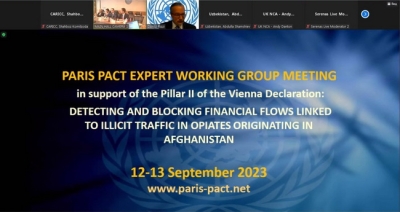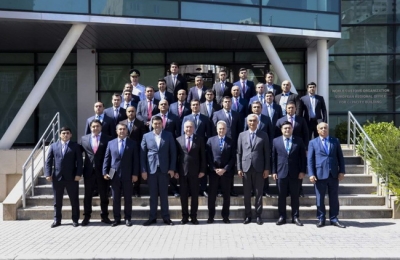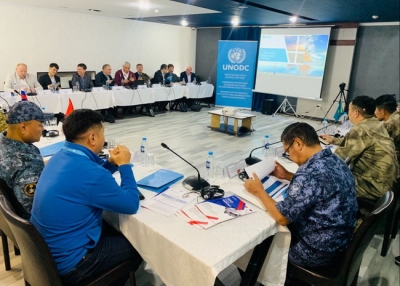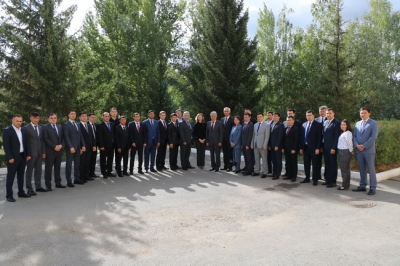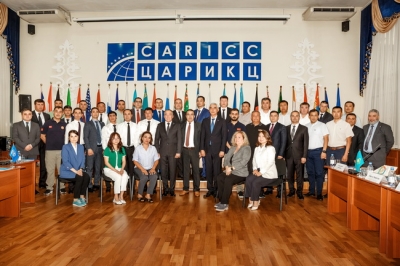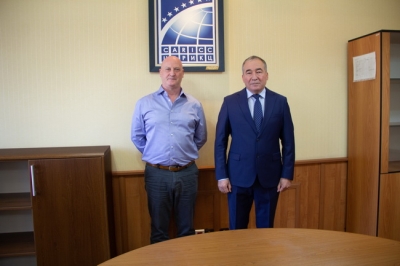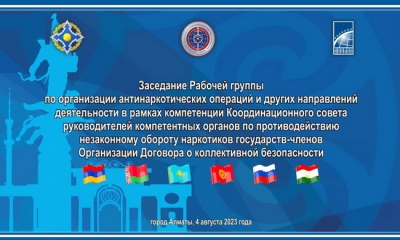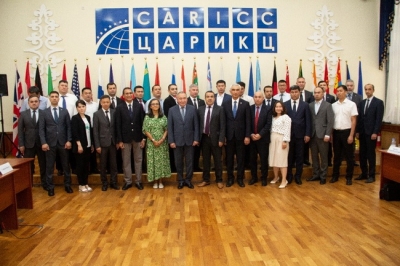Breaking news (528)
on the participation of CARICC in the meeting of experts of the Paris Pact on illicit financial flows
On September 12–13, 2023, an online meeting of the Paris Pact Working Group of Experts on Illicit Financial Flows was held in Ankara, in which employees of the CARICC Information and Analytical Department took part.
The event was attended by more than 160 participants representing 35 partner countries and 10 international and regional partner organizations.
Participants reviewed current issues as well as recent key operational actions and took stock of the recommendations adopted at the last EWG meeting on illicit financial flows. The meeting decided to propose four priority operational recommendations for further consideration and approval at the 17th Policy Advisory Group Meeting (PCGM), scheduled to be organized from 11 to 12 December 2023 in Vienna.
Also, the meeting participants paid special attention to the issues of countering the criminal use of virtual assets and «Hawala» type money transfer systems in the financial support of the illicit trafficking of Afghan opiates.
Based on the results of the event, the participants developed recommendations containing response measures, including a strategy and plans for joint action.
Image Gallery
https://caricc.org/index.php/en/news?start=144#sigProIdea935e3c9c
CSTO sub-regional counternarcotics operation "Channel Interception"
Sub-regional counternarcotics operation "Channel Interception" was carried out from 11 to 15 September on the territory of CSTO Member States. International Coordination Office to run the operation was stationed in Almaty at CARICC premises.
The operation was aimed at interdicting distribution channels for narcotics, their precursors and analogues, new psychoactive and potent substances, neutralizing international transnational drug groups, and dismantling clandestine drug production and disrupting economic foundations of drug business, including legalization of drug profits.
Coordinated actions during the operation resulted in the seizure of more than 897 kg of narcotic drugs and psychotropic substances, including 61.5 kg of mephedrone, 2.8 kg of MDMA, 12.2 kg of α-PVP, 237 kg of marijuana, 301 kg of hashish, 2.5 kg of heroin, more than 1 kg of potent substances and more than 34 kg of precursors on the territory of CSTO Member States. 48 firearms and about 2 773 rounds of ammunition of various caliber were confiscated. 854 drug crimes were detected, 4 illegal drug laboratories were dismantled. Law enforcement officers and security services detained 399 persons for committing crimes related to drug trafficking, including 44 wanted persons. 444 Internet websites disseminating prohibited drug-related information were identified.
The International Coordination Office convened two round tables on countering synthetic drugs and laundering criminal drug proceeds. Best practices in this area were also shared.
Representatives of China, Iran, UNODC and CARICC also participated in the International Coordination Office as observers.
Moreover, the III International Specialized Training of Canine Services of the Ministry of Internal Affairs of Kazakhstan and Kyrgyzstan was conducted as part of the operation "Channel Interception".
Image Gallery
-
 Click to open image!
Click to open image!
Click to open image!
Click to open image!
-
 Click to open image!
Click to open image!
Click to open image!
Click to open image!
-
 Click to open image!
Click to open image!
Click to open image!
Click to open image!
-
 Click to open image!
Click to open image!
Click to open image!
Click to open image!
-
 Click to open image!
Click to open image!
Click to open image!
Click to open image!
https://caricc.org/index.php/en/news?start=144#sigProIdf89a45c774
CARICC participation in Forum of the Eurasian Group on Combating Money Laundering and Financing of Terrorism
Eurasian AML/CFT Forum organized by the Secretariat of the Eurasian Group on Combating Money Laundering and Financing of Terrorism (EAG) was held in Issyk-Kul region of the Kyrgyz Republic on 4 - 5 September 2023 in a hybrid format, attended in an online format by Mr. Sh. Komilzoda, CARICC analyst.
Forum was organized by the EAG Secretariat in partnership with the State Financial Intelligence Service under the Ministry of Finance of the Kyrgyz Republic.
Forum was attended by leading experts in the field of AML/CFT of EAG member states, including representatives of law enforcement agencies, financial intelligence units of the Republic of Belarus, the Republic of Kazakhstan, the Kyrgyz Republic, the Russian Federation, the Republic of Tajikistan, Turkmenistan and the Republic of Uzbekistan, as well as representatives of EAG observer states, international and regional organizations and anti-terrorist structures.
The Eurasian Forum's objectives were to exchange expert opinion, experience and best practices on the latest developments in investigation of money laundering and terrorist financing cases.
Participants presented presentations and reports on financial investigations, in particular, methodology of seizure, freezing and confiscation of virtual assets obtained by criminal means or intended for terrorist financing, as well as practical aspects of countering crimes committed using information and communication technologies and virtual assets.
The event concluded with a discussion of new approaches and techniques in financial investigations and a discussion of draft recommendations on countering exploitation of virtual assets to finance terrorism.
Image Gallery
https://caricc.org/index.php/en/news?start=144#sigProId368ffe9bae
CARICC Director working meetings in Baku
Working meetings of CARICC Director Mr. Atageldi Yazlyyev with heads of competent authorities of the Republic of Azerbaijan were organized on 5-6 September 2023 in accordance with CARICC Main Events Plan.
Talks were organized with Mr. V. Eyvazov, Minister of Internal Affairs, and Mr. Sh. Bagirov, Chairman of the State Customs Committee. At the meeting parties exchanged views on development of drug situation in Azerbaijan and in CARICC Member States, outlined measures on stimulation of interaction on organization of international counternarcotics measures, further coordination of matters related to organization of CARICC activities brought up before regular meeting of the Council of National Coordinators.
In addition, a meeting was held with leadership of the Regional Office for Capacity Building (ROCB) of the World Customs Organization Europe Region. CARICC presentation on its performance results, perspectives and plans for the future was delivered to staff members of ROCB and SCC of Azerbaijan during the event.
Image Gallery
-
 Click to open image!
Click to open image!
Click to open image!
Click to open image!
-
 Click to open image!
Click to open image!
Click to open image!
Click to open image!
-
 Click to open image!
Click to open image!
Click to open image!
Click to open image!
-
 Click to open image!
Click to open image!
Click to open image!
Click to open image!
-
 Click to open image!
Click to open image!
Click to open image!
Click to open image!
-
 Click to open image!
Click to open image!
Click to open image!
Click to open image!
https://caricc.org/index.php/en/news?start=144#sigProIde1acb14665
CARICC delegation participation in a regional meeting to discuss innovative methods of utilizing unmanned aerial vehicles
CARICC delegation headed by Director A. Yazlyyev took part in a regional meeting to discuss innovative methods of using unmanned aerial vehicles (UAVs) in countering transnational criminal groups involved in drug trafficking in Karakol (Kyrgyzstan) on 28-29 August 2023.
Delegations from Kazakhstan, Kyrgyzstan, the Russian Federation, Tajikistan, Turkmenistan, Uzbekistan and UNODC experts also ttended the event.
The meeting was conducted under the UNODC project "Enhancement of the capacity of Mobile Operational Teams (MOTs) for the Counter Narcotics Service (CNS) of the Ministry of Internal Affairs of the Kyrgyz Republic", implemented with the financial support of the Russian Federation.
The meeting focused on countering drug trafficking through the use of UAVs or drones, which are becoming an important tool in modern law enforcement, especially in combating illicit drug trafficking. Law enforcement agencies were using those technologies for surveillance, detection and tracking, which gave them a significant edge in the fight against transnational criminal groups involved in drug trafficking.
Image Gallery
https://caricc.org/index.php/en/news?start=144#sigProId781fc90f68
CARICC analysts delivered training for law enforcement officers of Central Asian countries
A training course on application of analytical software in investigation of drug crimes was held at the Academy of Law Enforcement Agencies under the General Prosecutor's Office of the Republic of Kazakhstan (Kossрy/Kazakhstan) from 14 to 18 August 2023.
This event was organized jointly with the United Nations Office on Drugs and Crime Regional Office for Central Asia with a grant from the U.S. Department of State Bureau of International Narcotics and Law Enforcement Affairs (INL). CARICC analysts conducted the trainings.
Training course gathered law enforcement officers from Central Asian countries, representatives of UNODC and the U.S. Embassy in Astana.
Representatives of CARICC, UNODC and U.S. INL held a meeting with leadership of the Academy of Law Enforcement Agencies under the General Prosecutor's Office of the Republic of Kazakhstan, during which they addressed questions of organizing and conducting similar joint training sessions and simulation exercises.
Image Gallery
-
 Click to open image!
Click to open image!
Click to open image!
Click to open image!
-
 Click to open image!
Click to open image!
Click to open image!
Click to open image!
-
 Click to open image!
Click to open image!
Click to open image!
Click to open image!
https://caricc.org/index.php/en/news?start=144#sigProId850a2dfbb2
Bilateral working meeting with representatives of the Ministry of Interior of the State of Qatar
Mr. A. Yazlyyev, CARICC Director, met with Mr. Mohammed Abdulla Al-Khater, Director of Studies and International Affairs Department, Ministry of Interior of the State of Qatar, in Almaty on 14 August 2023.
CARICC Director Mr. A. Yazlyyev briefed on current efforts of the Centre in coordination of counternarcotics operations and information-analytical work.
In turn, Mr. Mohammed Abdulla Al-Khater, Director of Studies and International Affairs Department, informed about joint measures carried out in countering drug trafficking, and also described in detail main directions of actions of the Ministry of Interior of Qatar in the field of combating drugs.
Mr. Sh. Komilzoda, staff member of the Information and Analytical Unit of CARICC, delivered a presentation on results achieved by the Centre in organization and implementation of joint counternarcotics measures, and outlined the Centre's information and analytical branch.
The Qatar delegation highly valued CARICC's efforts in coordinating and conducting joint counternarcotics operations.
Parties underlined the importance of enhancing bilateral cooperation against the backdrop of rapidly evolving drug situation and increasing seizures of drugs in their respective regions.
Image Gallery
-
 Click to open image!
Click to open image!
Click to open image!
Click to open image!
-
 Click to open image!
Click to open image!
Click to open image!
Click to open image!
-
 Click to open image!
Click to open image!
Click to open image!
Click to open image!
https://caricc.org/index.php/en/news?start=144#sigProIdfbbf4abdf7
CARICC hosted Regional Training Course for Central Asian Competent Authority Officers
On 7-11 August 2023 CARICC hosted a Regional training course for law enforcement officers on detection and interdiction of organized crime under the Cross Border Cooperation component of the UNODC Programme for Central Asia.
The event brought together border control and customs officials, law enforcement officers from the Republic of Kazakhstan, the Kyrgyz Republic, the Republic of Tajikistan, Turkmenistan, the Republic of Uzbekistan, experts from the UNODC Programme Offices in Central Asia, the Turkish International Academy Against Drugs and Organized Crime (TADOC), the Central Drug Control Directorate of the Italian Ministry of Interior and CARICC.
In line with the meeting program, CARICC staff members delivered presentations on current situation in the region and Afghanistan and its impact on drug situation in Central Asia.
Modern methods of detection of drug crimes and countering transnational organized crime were studied.
Participants recognized the importance of expanding international cooperation, sharing experience and further developing relations in the area of border security and countering transnational drug crime.
Image Gallery
-
 Click to open image!
Click to open image!
Click to open image!
Click to open image!
-
 Click to open image!
Click to open image!
Click to open image!
Click to open image!
-
 Click to open image!
Click to open image!
Click to open image!
Click to open image!
-
 Click to open image!
Click to open image!
Click to open image!
Click to open image!
-
 Click to open image!
Click to open image!
Click to open image!
Click to open image!
-
 Click to open image!
Click to open image!
Click to open image!
Click to open image!
-
 Click to open image!
Click to open image!
Click to open image!
Click to open image!
-
 Click to open image!
Click to open image!
Click to open image!
Click to open image!
-
 Click to open image!
Click to open image!
Click to open image!
Click to open image!
https://caricc.org/index.php/en/news?start=144#sigProIdfc9dbcfe72
More...
Meeting with K. Williamson, Law Enforcement Advisor of the UNODC Regional Programme for Afghanistan and Neighbouring Countries
Mr. A. Yazlyyev, CARICC Director, met with Mr. Kenneth Williamson, Law Enforcement Advisor of the UNODC Regional Programme for Afghanistan and Neighbouring Countries in Almaty on 10 August 2023.
CADICC Director Mr. A. Yazlyyev informed about ongoing actions of the Centre in coordination of counternarcotics operations and information-analytical work.
He highlighted the Centre's comprehensive analysis of drug situation in the region, indicating that it is worsening due to the threat of synthetic drugs distribution, including through the Internet.
During the meeting participants exchanged views on strengthening analytical capacity of CARICC, organization of training events for representatives of competent authorities of the Centre's Member States.
Image Gallery
-
 Click to open image!
Click to open image!
Click to open image!
Click to open image!
-
 Click to open image!
Click to open image!
Click to open image!
Click to open image!
-
 Click to open image!
Click to open image!
Click to open image!
Click to open image!
https://caricc.org/index.php/en/news?start=144#sigProIdcd12371629
Meeting with Liaison Officer of the National Police of the Kingdom of the Netherlands
Mr. A. Yazlyyev, CARICC Director, met with Mr. Hans Houwen, Police Liaison Officer of the Kingdom of the Netherlands, on 8 August 2023 in Almaty.
Mr. A. Yazlyyev, CARICC Director, provided information on current efforts of the Centre in organization and coordination of international controlled delivery operations as well as information and analytical work.
A presentation was given on CARICC's work, initiatives and plans for the near future.
In turn, Mr. H. Houwen informed that he is a regional liaison officer (with office in Tbilisi) of the National Police of the Kingdom of the Netherlands. Representative of the Netherlands expressed interest in continuing close cooperation with CARICC in organization and implementation of counternarcotics operations based on the example of a successfully executed joint operation in 2022.
Parties also discussed topics of cooperation of mutual interest.
Image Gallery
https://caricc.org/index.php/en/news?start=144#sigProId68401ff2af
Working group meeting on organization of counternarcotics operations under CSTO
A meeting of working group on organization of counternarcotics operations and other actions in the scope of the Coordination Council of Heads of Competent Authorities for Countering Illicit Drug Trafficking (KSOPN) of the CSTO Member States was held in Almaty on 4 August 2023.
Heads and members of specialized departments of law enforcement agencies of CSTO Member States, representatives of Rosfinmonitoring and CARICC attended the meeting.
The meeting was mainly aimed at discussing organizational aspects of the counternarcotics operation "Channel-Interception" under the auspices of CSTO.
Operation objectives include interdiction of distribution channels for new psychoactive substances (NPS), opiates and cannabinoids along the Northern Route, detecting and dismantling clandestine laboratories for illicit drug production.
Participants also discussed recent trends in drug situation on the territory of CSTO Member States in 2023 and forecasts of its development in the second half of 2023.
Image Gallery
https://caricc.org/index.php/en/news?start=144#sigProId983919cd75
Working group meeting on establishment of the Regional Information and Communication System
CARICC hosted a working group meeting on development of the Regional Information and Communication System under the joint UNODC-CARICC initiative on 3-4 August 2023.
The meeting brought together border and customs officials, and law enforcement and special agencies of the Republic of Kazakhstan, Kyrgyz Republic, Republic of Tajikistan, Turkmenistan, Republic of Uzbekistan, experts from UNODC Programme Offices in Central Asia and CARICC.
Mr. Yusuf Kurbonov, International Coordinator of the UNODC Programme for Central Asia, and Mr. Atageldi Yazlyyev, CARICC Director, delivered welcoming remarks during the event.
Objectives and tasks of the working meeting were to discuss results of implementation of recommendations contained in outcome document of the Regional Expert Meeting of Heads of Analytical Departments of Competent Authorities of Central Asian countries of 3 August 2022, regarding development of a working group to elaborate the "Concept and Terms of Reference for Establishment of the Regional Information and Communication System" and its adoption.
Discussions resulted in endorsement of the draft "RICS Development Concept" and recommended that UNODC and CARICC consider organizing and hosting working group meetings to design legal framework and technical specifications for RICS creation.
Participants underscored the importance of engagement by enhancing international cooperation, sharing positive experiences and further developing relations in the field of border security and countering transnational drug crime.
Image Gallery
-
 Click to open image!
Click to open image!
Click to open image!
Click to open image!
-
 Click to open image!
Click to open image!
Click to open image!
Click to open image!
-
 Click to open image!
Click to open image!
Click to open image!
Click to open image!
https://caricc.org/index.php/en/news?start=144#sigProId9a11562af5

